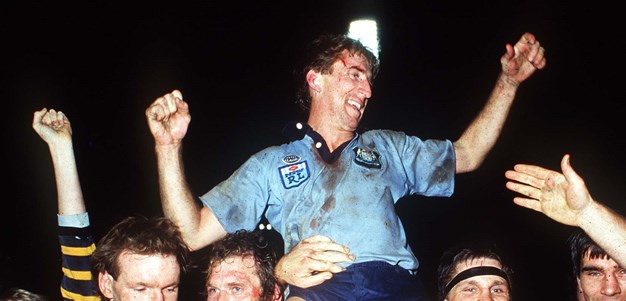1990-1997: NSW '90s

Once again, a relatively new-look NSW side was brought in with the aim of returning the shield in 1990, with Ricky Stuart partnering Raiders teammate Laurie Daley in the halves for the first time. The series started well for the Blues with an 8-0 win – their first in three years and first ever at the Sydney Football Stadium – with Ben Elias earning Man-of-the-Match honours.
The contest then headed further south in Game Two; Melbourne's Olympic Park hosted its first Origin and another close Blues victory as they finally enjoyed a well-deserved series win.
It looks like you may be using adblocking software to view this site.
Many features on the site, such as video playback, may not work properly when using adblocking software.
Please whitelist our domain or disable your adblocker to access all features and videos.
Fittler Debuts as NSW Claims 1992 Origin Series
The 1991 series is still considered one of the closest of all time, with just two points separating all three of the games, but ultimately the result fell the way of Queensland with a 2-1 victory.
After NSW lost 6-4 in the series opener, intensely physical tactics were employed by front-rower Mark Geyer in Game Two - and his confrontation with Queensland captain Wally Lewis maintained the interstate rivalry. A high elbow later in the game, however, would ultimately spell the end to Geyer's three-game Origin career, with Lewis victorious in his own finale a game later.

The series defeat resulted in the sacking of NSW coach Tim Sheens, with Bulldogs and Panthers premiership-winning mentor Phil Gould taking the reins for the 1992 series, while Daley (aged 22) was named captain. Coming up against Raiders captain Mal Meninga (aged 31), the pair became the first club teammates to lead their respective states against each other.
Gould and Daley's appointment proved to be a masterstroke for the Blues, who kick-started their return to form with a 14-6 victory at the Sydney Football Stadium. A 5-4 loss in Brisbane was followed by a series-deciding win at home again a fortnight later, with Gould's coaching, Daley's captaincy and Stuart's individual performance largely accredited to the result.
Rugby League underwent a major development in 1993, with the five-metre defensive line extended to 10 metres, but NSW responded positively to the change. Once again, Daley overcame club captain Meninga to lead the Blues to a 2-1 victory, clinching the first and second games of the series.
The same result followed in 1994, as NSW achieved three consecutive Origin series wins for the first time. That series saw Origin return to Melbourne, this time in front of 87,161 at the Melbourne Cricket Ground, and NSW ruin Meninga's farewell with wins at the MCG and Lang Park.

As the state's greats began to retire, Queensland had been struggling to keep up with the never-ending talent south of the border – but the game-wide upheaval of the Super League War allowed the Maroons' fresh faces to do the unthinkable in 1995. Coach Paul Vautin took over and the side dubbed 'Fatty's Nobodies' managed a 3-0 whitewash.
After eligible players were limited by the Super League War in 1995, selection was opened up to all players again in 1996, helping NSW return to Origin glory. For the first time ever, the Brad Fittler-captained Blues remained unchanged for the entire series, with the 17 players delivering on an impressive 3-0 triumph. The side also included eventual Rugby League Immortal Andrew Johns, who began to make his mark after an unsuccessful 1995 series.
The 1997 season saw the height of the Super League War, with Rugby League divided into two directly-opposed competitions throughout Australia. It resulted in two versions of State of Origin, with the Super League staging a tri-series involving NSW, Queensland and New Zealand. The state narrowly won that tournament and a separate team followed it with another close win in the ARL-aligned series, which is the officially-recognised title.
The Tommy Raudonikis-coached Blues defeated the Maroons by just two and one points in the first two games of 1997, but in doing so achieved their longest winning streak of five games. With the formation of the National Rugby League in 1998, however, results would appear to swing back the way of Queensland the following year.

New South Wales Rugby League respects and honours the Traditional Custodians of the land and pay our respects to their Elders past, present and future. We acknowledge the stories, traditions and living cultures of Aboriginal and Torres Strait Islander peoples on the lands we meet, gather and play on.



